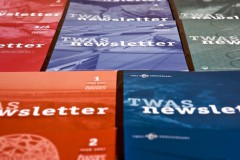 PEER – Partnerships for Enhanced Engagement in Research – is a new programme from the US Agency for International Development (USAID) that invests in research ideas with the potential to address long-standing development challenges. The programme is featured in the latest edition of the TWAS Newsletter.
PEER – Partnerships for Enhanced Engagement in Research – is a new programme from the US Agency for International Development (USAID) that invests in research ideas with the potential to address long-standing development challenges. The programme is featured in the latest edition of the TWAS Newsletter.
Launched in 2011 with the US National Science Foundation (NSF) and administered by the US National Academy of Sciences (NAS), PEER promotes North-South research partnerships by funding projects that address a wide range of development issues, including food security, climate change, water, biodiversity, disaster mitigation, and renewable energy.
One example of the programme's success is research measuring coral health in the coastal reefs of Indonesia that was supported by a PEER grant and featured The New York Times in January. PEER has also contributed to research on air pollution in Mongolia, earthquake and landslide risk in Lebanon, drinking-water quality in Kenya, and tropical diseases in numerous developing countries.
The faculty and students involved go beyond the laboratory and field to attend professional development workshops and scientific conferences. An underlying assumption is that cooperation between scientists from the US and developing countries that will endure beyond the research grant.
The PEER model includes two highly competitive grants: PEER Science and PEER Health. Both grants invite scientists and engineers in developing countries to apply for funds to support research and capacity-building activities conducted in partnership with collaborators funded by NSF or the US National Institutes of Health (NIH). NAS sends funding from USAID for PEER awards directly to research institutions in developing countries.
Applications are peer-reviewed primarily for the scientific feasibility, development impact of their proposal, and the strength of the collaboration. The USAID field office then reviews the top-ranked applications that emerge from peer review to choose finalists. This year, for instance, USAID extended PEER Science eligibility to include Burma, Tunisia, and Libya – all countries that have recently gone through or are still experiencing tumultuous changes. Programme eligibility also continues to expand in countries that are emerging, including many Caribbean islands where science and technology can help the country transition from a foreign assistance recipient to a partner in addressing global challenges.
The next call for proposals is expected to be in September 2013.
Also in the latest issue of the TWAS Newsletter:
- Former TWAS President Jacob Palis looks back on his six years of leadership.
- Mohammed H.A. Hassan, TWAS’s former executive director, discusses the challenges that remain in the developing world 30 years after the academy’s founding.
- Plant biotechnology pioneer Roger Beachy discusses the rationale for GMOs.
- Wetlands preservation expert Nick Davidson on preserving vital habitats.
- Remembering the legacy of Rita Levi-Montalcini, Nobel laureate and committed friend of TWAS.
Sean Treacy

